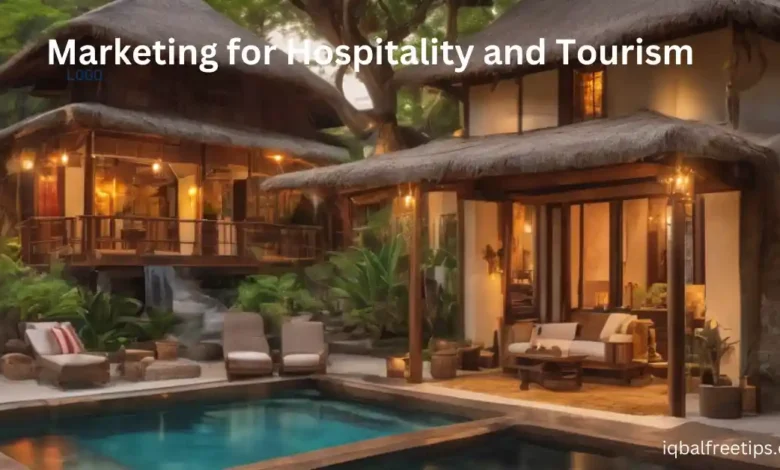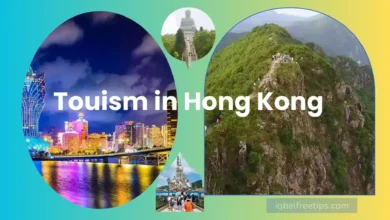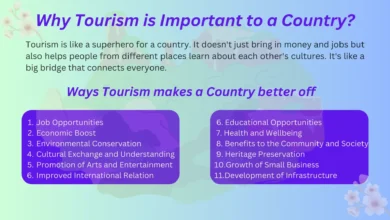
Marketing for Hospitality and Tourism
marketing for hospitality and tourism.
Marketing for Hospitality and Tourism is the art and science of promoting and advertising travel, accommodation, dining, and entertainment services. It involves creating compelling strategies to attract and engage travelers, boost bookings, and enhance the overall guest experience. Explore this essential field to discover how it shapes the success of businesses in the vibrant world of hospitality and tourism.
The network of relationships and tactics utilized in hospitality and tourism marketing is used to advertise goods and services in the travel sector. With a focus on providing unique experiences for customers, marketing promotes travel locations, lodging options, transportation options, and local activities. The majority of tourists book their vacations online, and as a result, the travel industry has fully adapted by utilizing digital marketing methods.
The secret to success in the fast-paced business of marketing in hospitality and tourism is creating great experiences. The key marketing methods of tourism and hospitality discussed in this article are audience comprehension, social media marketing, internet presence, sustainability, and others. Join us on this adventure to learn how to engage your audience and leave a lasting impression in the digital age.
What is Marketing for Hospitality and Tourism?
The best experience and customer happiness are the main goals of hospitality marketing. The focus of tourism marketing is on the location and occasions that tourists can have while traveling. You might increase your target audience and provide them with a well-rounded vacation experience by combining the two.
- Understand your Target Audience
- Social Media Marketing
- Focus on Ecotourism
- SEO (Search Engine Optimization)
- Mobile Optimized Website
- Lead Generation
- Online Presence
- Content Marketing
- Email Marketing
- Influencer Marketing
- Packages and Social Promotion
- Local Partnership
- Data Analytics
- Customer Experience
- Sustainability Initiatives
Understand Your Target Audience
It is crucial to understand your target market and how to contact them. Are you targeting vacationers, business travelers, thrill-seekers, families, or a certain niche market? Knowing your target market enables you to adjust your marketing tactics as necessary.
Social Media Marketing
Any marketing strategy for travel and hospitality should include social media as a key tool. Customers will utilize social media in some capacity in the great majority of cases. Are you utilizing all of the resources available to you? You should, at the very least, be active on Facebook, Twitter, Instagram, and TikTok given the popularity of short-form videos, particularly those connected to travel.
Consider hiring a specialist if you find social media marketing challenging or if you’ve had trouble getting people to interact. There are resources for assistance that are worthwhile. Bookings can increase thanks to a social media marketing approach that makes you visible to clients and remains relevant. Apply the demographic data provided by your pages to target your efforts in the right places.
Focus on Ecotourism
Ecotourism is a contemporary concept that combines conservation and sustainable travel to help the environment and local communities. This practice goes beyond just enjoying the splendor of the outdoors. A developing trend that the tourism and hospitality industries should take note of is traveling with an emphasis on education and conservation while seeing the world’s natural beauties in a way that doesn’t affect the environment or the locals.
Search Engine Optimization (SEO)
Like the majority of internet users, you’ve probably used Google or other online search engines to look up information. Consider how frequently you’ve arrived at the desired information on the first page of search results. Now that you know how crucial SEO is for accommodation, you can use it to draw in more guests. A wide SEO marketing strategy will assist you in getting your website onto the first page of search results for your industry.
SEO uses keywords and the search engine algorithm to give your website more gravity. Search engines will give your site more weight and rank you higher among the results the more popular and extensive your network is. SEO includes all of the techniques you employ to improve your search engine ranking.
Lead Generation
By identifying your target market, you may concentrate your marketing efforts where they have the most chance of success. In any larger marketing plan, lead creation is a key component. Both travelers who are already making travel plans and those who are considering traveling but aren’t sure yet need to be reached.
Online Presence
Online Presence: In today’s world, a strong online presence is crucial. Create a website that is visually appealing and has intriguing content. To ensure that your website ranks highly in search results, perform SEO on it. When trying to reach a larger audience, consider employing online travel agents (OTAs).
Mobile Optimized Website
A professional, mobile-optimized website is the most crucial marketing tool you have, especially in the tourist and hospitality sectors. Consumers will investigate areas before making travel plans. Cell phones will be used for the vast bulk of those searches. Your website must be compatible with a wide range of devices.
Content Marketing
Among the variety of digital marketing tactics, content marketing is one of the most effective. Your website’s content will draw visitors and aid in your efforts to generate leads, establish your brand, and increase awareness.
Create compelling content that highlights the distinctive qualities and experiences the business has to offer. This can include trip guides, images, pictures, and blog postings. In addition to assisting with SEO, content marketing establishes your business as a specialist in the field.
Email Marketing
Collect guest email addresses to send them individualized offers, newsletters, and updates. You can keep in touch with previous customers using email marketing and persuade them to come back.
Influencer Marketing
Work with bloggers and influencers in the travel industry to promote your products. Influencers can aid in expanding your audience and providing sincere advice.
Packages and Social Promotion
Special specials and Packages: To draw customers, create appealing specials, discounts, and packages. These might consist of offers for extra stays, food plans, or unique experiences.
Local Partnership
To develop cross-promotional opportunities, and collaborate with nearby companies, tourist destinations, and event planners. This will enable you to reach out to the neighborhood market and give visitors a more thorough experience.
Data Analytics
Analyze data to track the success of your marketing campaigns. To improve your strategy over time, analyze website traffic, consumer demographics, and booking trends.
Customer Experience
Provide outstanding customer experiences and service to encourage favorable word-of-mouth marketing. Customers who are happy with your service are more drawn to tell others about it.
Sustainability Initiatives
The sustainable and eco-friendly practices that your company employs should be highlighted. Many tourists are now looking for environmentally friendly solutions.
Conclusion
Success in the competitive world of hospitality and tourism marketing depends on providing customers with extraordinary experiences. You may effectively interact with tourists by knowing your target market, using social media, highlighting sustainability, and maximizing your internet visibility. Remember that creating lasting memories and making every journey unique are the two main focuses of marketing in this sector.
You may like:
What is Cultural Exchange? And Its Benefits




